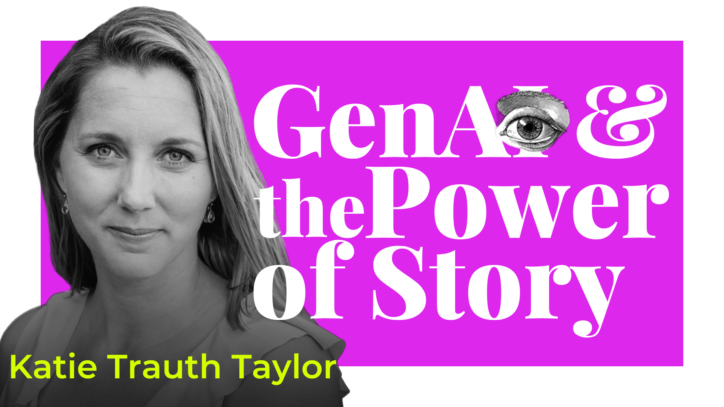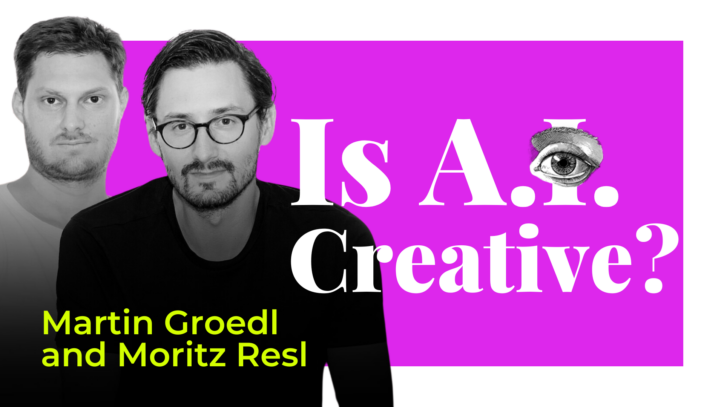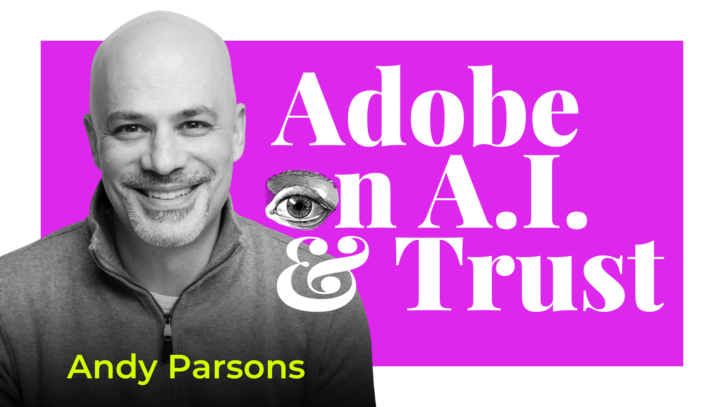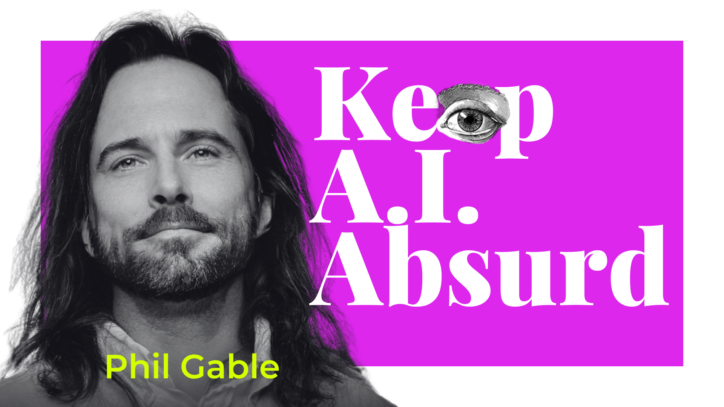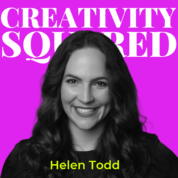
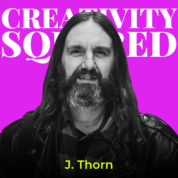
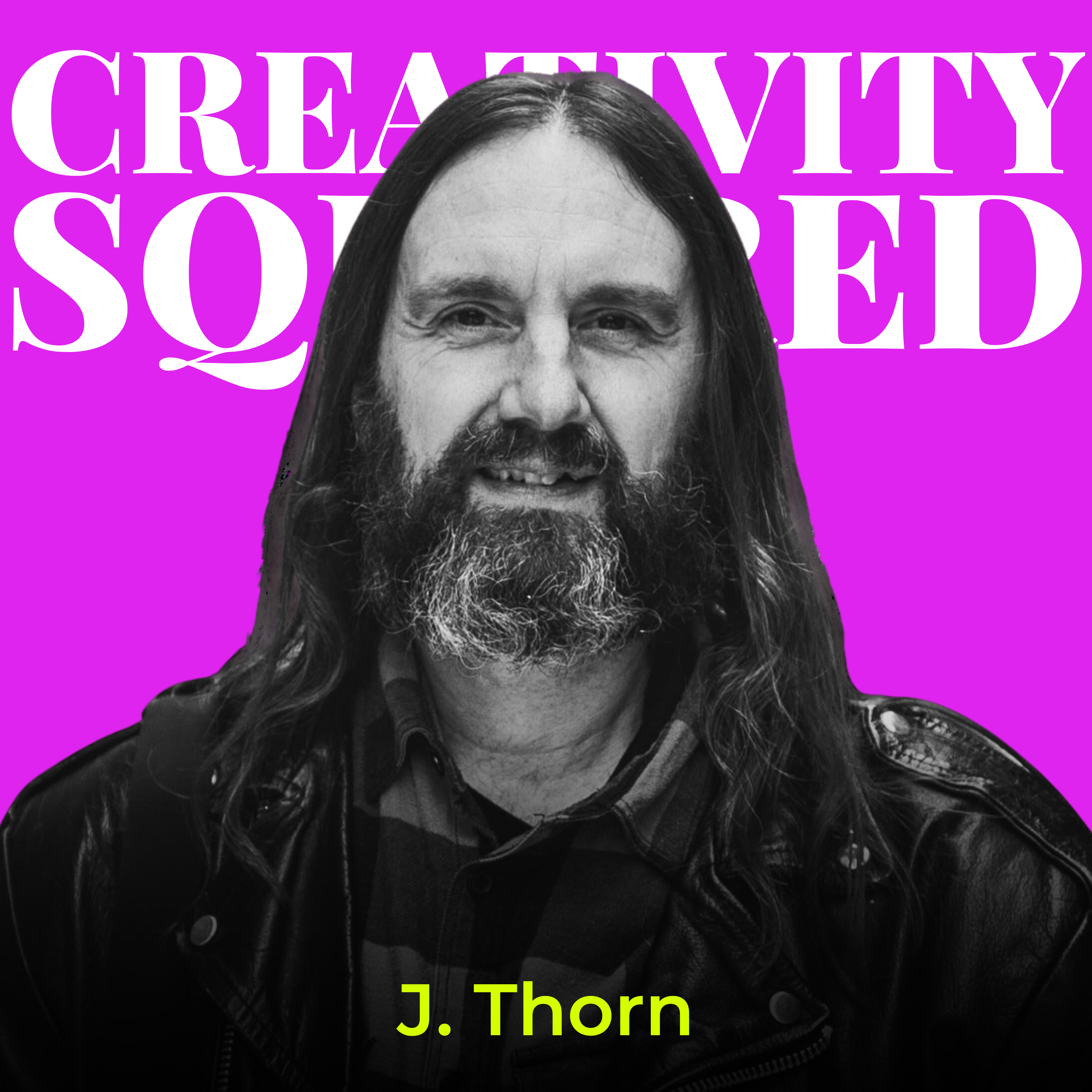
Ep40. From A.I. Prompts to Process: How ChatGPT-4 & GenAI is Impacting Writers from A.I. Author, Editor & Independent Publisher J. Thorn
In the rapidly evolving world of artificial intelligence, few areas have been as profoundly impacted as the creative industries with the onset of GenAI. From writing and publishing to art and entertainment, A.I. is reshaping the landscape in ways that were once the stuff of science fiction.
To explore this fascinating intersection of technology and creativity, Helen Todd recently sat down with J. Thorn, a prolific author, podcaster, and A.I. enthusiast, on the Creativity Squared podcast. J. also authors the Creative AI Digest, a newsletter about the intersection of A.I. and creativity, delivering a humorous and wise perspective for experienced creative professionals.
J. recently released the Self-Paced Online Course — Content Marketing with ChatGPT: The Definitive Content Creation Blueprint. He created it to boost your content marketing strategy with the power of artificial intelligence.
With his unique blend of insights as an author, entrepreneur, and educator, Thorn offers a captivating glimpse into the future of writing and publishing in the age of A.I.
To discover more about their conversation, continue reading below!
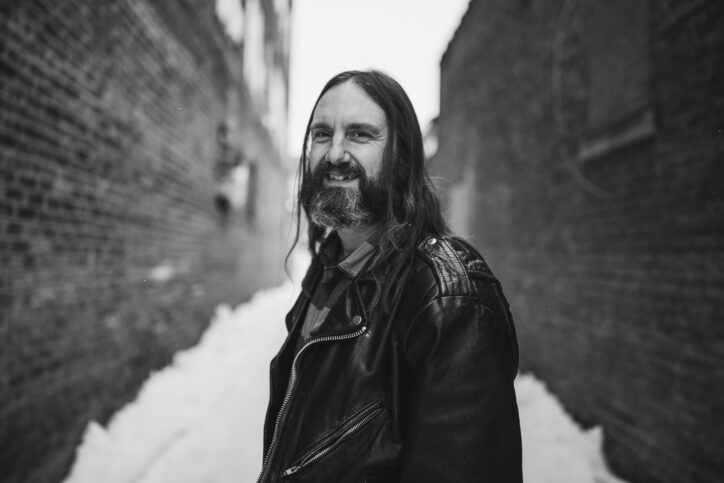
The Changing Face of Publishing
As the conversation begins, Thorn shares his origin story as an independent publisher and author and dives into the rich and storied history of the publishing industry.
“The publishing industry is pretty traditional…going back a century or more, there’s been a publishing industry of sorts.”
J. Thorn
As Thorn explains, the rise of digital technologies in recent years has brought about seismic shifts in the way books are written, published, and consumed.
Perhaps the most significant of these changes came in 2008, with the advent of Amazon’s Kindle Direct Publishing (KDP) platform.
“Amazon’s Kindle Direct Publishing platform allowed anyone to publish a book,” Thorn elaborated, “and there are literally millions and millions of books on Amazon now, most of which are never even opened.”
KDP democratized the publishing industry, making it possible for anyone with an internet connection to become a published author. This led to an explosion of new voices and ideas, but it also created an oversaturated market where millions of books compete for readers’ attention. Many of these books, Thorn notes, remain unread, lost in the vast sea of content.
The emergence of A.I. has added yet another layer of complexity to this already dynamic landscape. For Thorn, the realization of A.I.’s transformative potential came in a sudden, powerful moment when he first experimented with ChatGPT-4.
“The difference between the free version of ChatGPT — as of recording this is 3.5 — and 4 was phenomenal,” Thorn describes.
“I knew within a matter of minutes that this was going to completely transform not only the publishing industry but…most of our society.”
J. Thorn
This epiphany set Thorn on a journey to explore the creative possibilities of A.I. and share his knowledge with others. As an author, podcaster, and educator, he saw an opportunity to help others navigate this new frontier and harness the power of A.I. for their own creative pursuits.
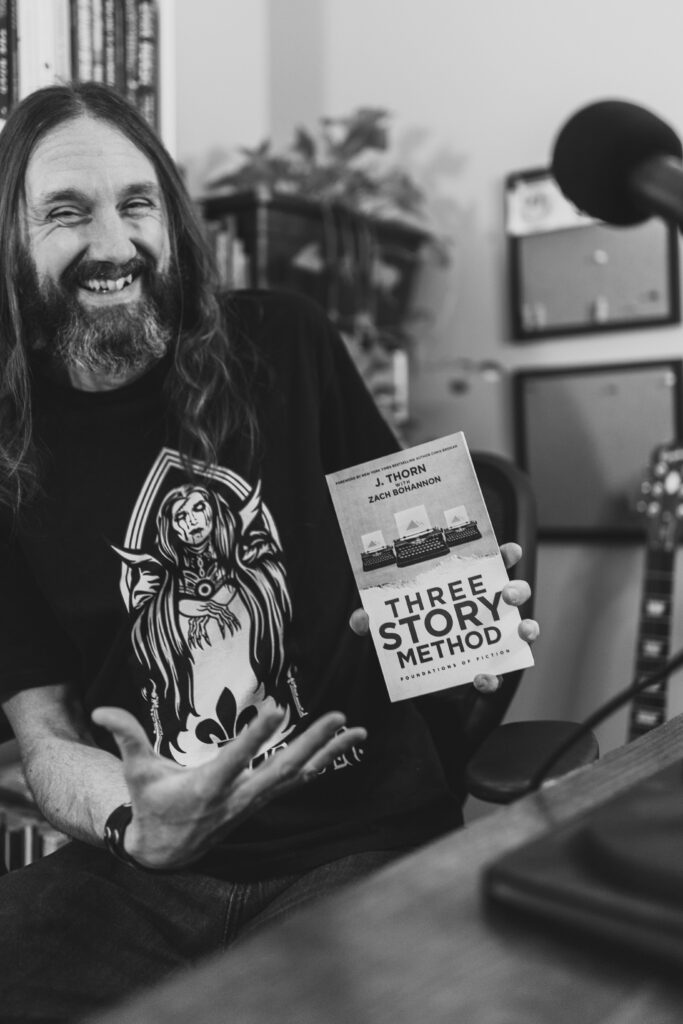
Embracing the A.I. Frontier
As an independent author and entrepreneur, Thorn has always been willing to take risks and experiment with new technologies. He attributes this mindset, in part, to his diverse background and the fact that his income isn’t solely dependent on his fiction sales.
“I’m a bit fearless in that I’m not really worried about what people say,” Thorn says. This has allowed him to dive headfirst into the world of A.I., exploring its potential applications in writing and publishing without fear of the consequences.
“I’ve always had an entrepreneurial mindset, and I think part of being an entrepreneur is the willingness to take risks, and to try things, and to be on what’s often called the bleeding edge.”
J. Thorn
For Thorn, being on the bleeding edge means embracing A.I. as a collaborator in the creative process.
He recounts a particularly illuminating experience where he “co-wrote” a story with ChatGPT, taking on the role of the protagonist while assigning a character role to the A.I. The resulting dialogue was remarkably coherent and engaging, showcasing the potential for human-A.I. collaboration in storytelling.
“I thought, what if I co-wrote with A.I.? But instead of writing it, we performed it,” Thorn shares. “I thought, what if I took the role as the protagonist, and I assigned a role in the story to ChatGPT?”
This experiment, and others like it, have convinced Thorn that A.I. is not a threat to human creativity, but rather a powerful tool that can enhance and augment it. By embracing A.I. as a collaborator, Thorn asserts, writers can push the boundaries of what’s possible, exploring new forms of expression and storytelling that were once unimaginable.
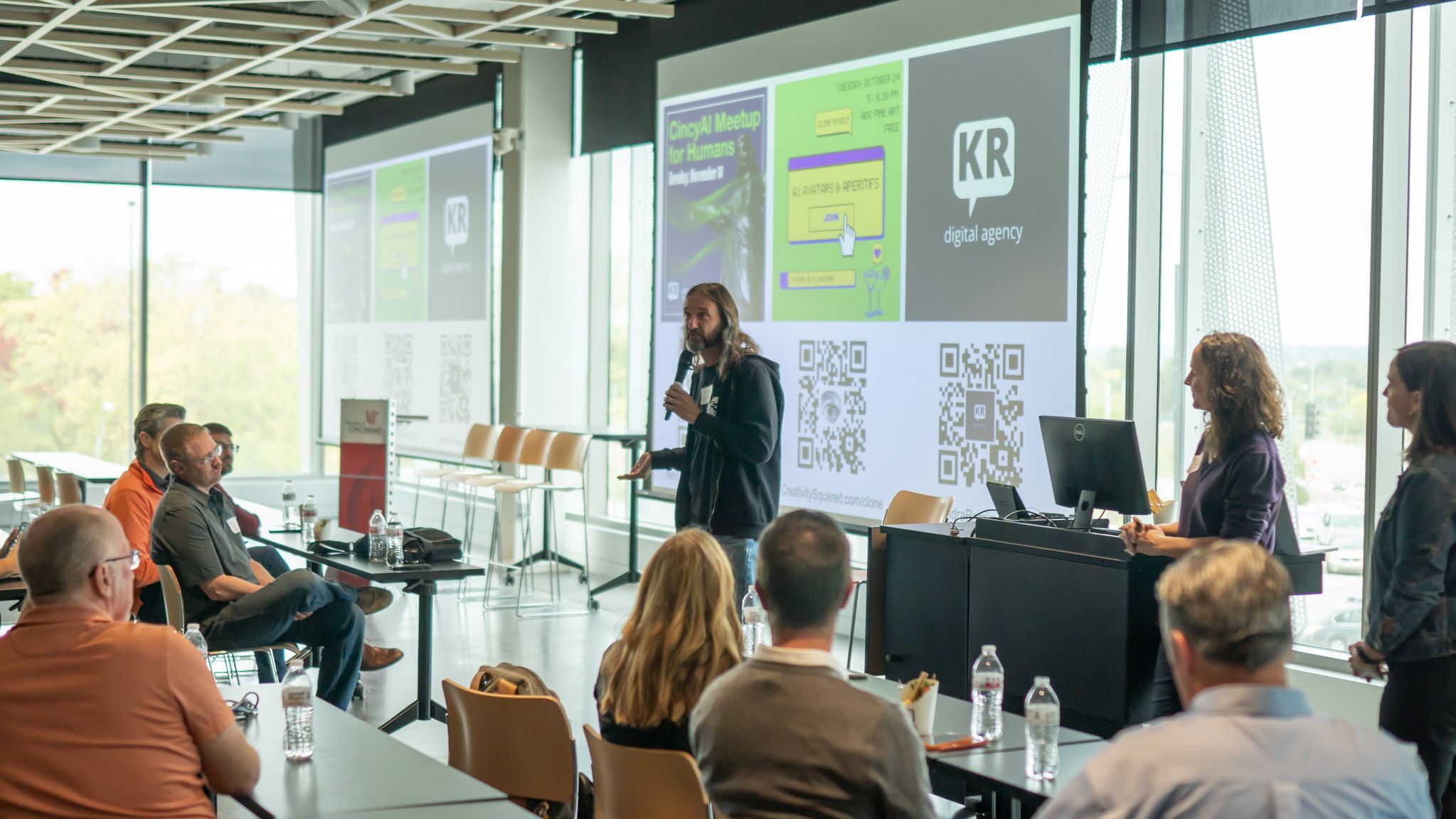
Accessibility & Ethics: A.I. in Creativity
One of the most compelling aspects of A.I. in the creative realm is its potential to increase accessibility. For Thorn, this is a deeply personal issue, as he has seen firsthand how A.I. tools can empower individuals who may have previously faced barriers to writing.
“A.I. is giving voice to people who haven’t had it before.”
J. Thorn
“There are authors who have physical limitations, disabilities, unfortunate circumstances, and they haven’t been able to write or they had to stop writing for some reason,” says Thorn. “And now A.I. is giving them the opportunity to do that again.”
Thorn explains that A.I. can level the playing field by assisting with tasks like proofreading, editing, and even idea generation, making it possible for more voices to be heard.
He envisions a future where A.I. is an integral part of the writing process, bridging the gap between the author’s initial drafts and the final, polished manuscript.
“I honestly believe this is the stopgap between the author’s last revision, where they’re so close to the work that they’re blinded by it, they can’t see it anymore,” continues Thorn. “And then before it gets to their editor, I think that’s a place there where A.I. can really make a difference.”
By catching errors, suggesting improvements, and even offering stylistic guidance, Thorn believes A.I. can help authors refine their work and bring their unique visions to life.
While Thorn is an enthusiastic proponent of A.I. in the creative process, he also acknowledges the ethical concerns surrounding its use.
One phenomenon he’s witnessed that he finds particularly troubling is “review bombing,” where authors who use A.I. in their writing are targeted with negative reviews and harassment by those who view such use of the technology negatively.
For Thorn, this behavior is not only misguided but also deeply harmful.
He insists that it fails to recognize the transformative potential of A.I. to make the creative process more accessible and inclusive.
Moreover, he believes that it perpetuates what he views as a false dichotomy between “real” writers and those who use A.I., while ignoring the fact that the technology is simply a tool, not a replacement for human creativity. At Creativity Squared, we also want to advocate for all writers, whether they use A.I. or not, and to stop review bombing because as J. explains, it hurts their livelihoods.
“I think a year from now, we probably won’t be talking about this,” Thorn goes on. “But it’s the kind of thing that’s happening right now. That’s really unfortunate.”
As A.I. becomes more ubiquitous and integrated into various aspects of our lives, Thorn believes that the resistance to its use in creative pursuits will eventually fade away. He envisions a future where A.I. is simply another tool in the writer’s toolkit, as common and accepted as word processors and spell checkers are today.

The Future of Writing & Publishing
Looking ahead, Thorn sees a world of endless possibilities for writers and publishers in the age of GenAI.
He believes that digital books, in particular, are an underutilized channel that creative professionals should be leveraging to reach new audiences and monetize their work.
“You can turn anything into a book,” Thorn explains. “A podcast, a YouTube video, a conversation, an interview — all of that now can easily be transcribed and collated and turned into text and then sold.”
With A.I. tools making it easier than ever to transcribe and transform content from various mediums into written form, Thorn believes the barriers to entry for aspiring authors are lower than ever.
The End of the Entertainment Industry as We Know It?
However, according to Thorn, the changes A.I. will bring to the creative industries go far beyond just writing and publishing.
He predicts that the entertainment industry as a whole will undergo a radical transformation in the coming years as A.I. begins to play a larger role in content creation and distribution.
“I believe that the entertainment industry as we’ve known it will cease to exist in the near future because of A.I. — and I don’t think that’s necessarily a bad thing.”
J. Thorn
He envisions a future where A.I.-generated content is the norm, where virtual actors and fully realized A.I.-generated worlds are indistinguishable from reality. While some may view this as a threat to human creativity, Thorn sees it as an opportunity for artists to push the boundaries of what’s possible and explore new forms of expression.
“I’d like to say to people: If you really love creating art, by all means, keep doing it,” Thorn elaborates. “But take some of the financial expectation off of yourself.” Thorn goes on to assert that creativity has historically not been a viable career path: “I think the past 10 to 15 years — whether it’s musicians or authors or performers — the ability to make a living at that was really an anomaly.”
“It’s a blip in human history,” he continues. “We’re outliers, and I think that era is coming to a close. Like a blacksmith — now, if you go to Colonial Williamsburg in Virginia, there’s a blacksmith there, and that blacksmith is an expert, and they love it. And they might sell a few things there. But, like, blacksmith isn’t an occupation.”
“People who love working with metal will continue to do that,” says Thorn. “And that’s great, but it’s more artistic. And it’s not necessarily for financial gain, in the way that we think of entertainment.”
Of course, this brave new world of A.I.-powered entertainment also raises a host of ethical and philosophical questions. As A.I. becomes more sophisticated and able to replicate human creativity with increasing fidelity, we’ll need to grapple with thorny issues around authorship, ownership, and the very nature of art itself.
But for Thorn, these challenges are not insurmountable. He believes that by approaching the A.I. revolution with open minds, empathy, and a commitment to using the technology for the greater good, society can navigate these uncharted waters and emerge stronger and more creative than ever before.
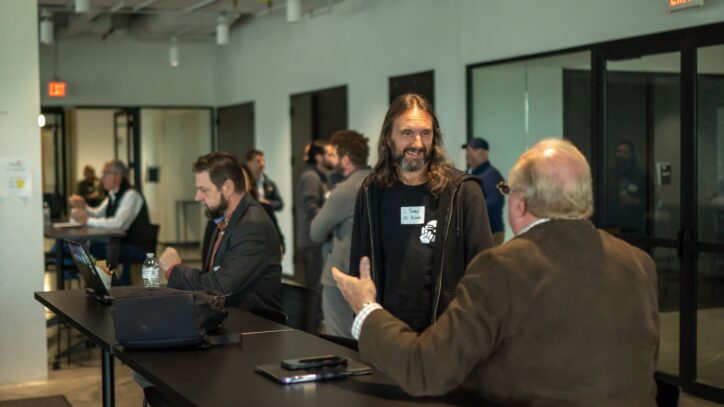
“Just be kind to each other. You don’t know what people are going through and what their situation is. And don’t rush to judgment. Just be kind to each other.”
J. Thorn
As the creative community grapples with the challenges and opportunities presented by A.I., Thorn maintains that it’s essential to approach one another with compassion and grace, recognizing that everyone is navigating this new landscape in their own way.
By embracing the transformative potential of A.I. while remaining grounded in our shared humanity, Thorn believes we can chart a course toward a future where technology and creativity work hand in hand to unlock new worlds of possibility — where the power of the human imagination is augmented, not replaced, by the tools we create and everyone, regardless of their background or circumstances, has the opportunity to share their unique voice with the world.
Links Mentioned in this Podcast
- Creative AI Digest
- J. Thorn’s Website
- J. Thorn on Amazon
- The Author Life Podcast
- Amazon’s Kindle Direct Publishing
- ChatGPT-4
- Colonial Williamsburg
Continue the Conversation
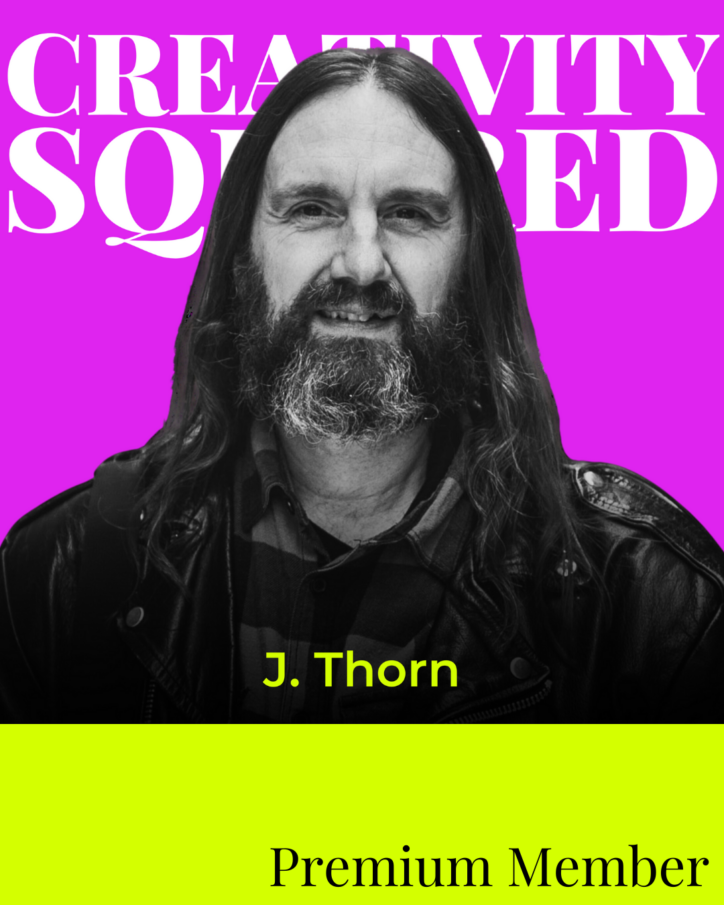
Thank you, J., for being our guest on Creativity Squared.
This show is produced and made possible by the team at PLAY Audio Agency: https://playaudioagency.com.
Creativity Squared is brought to you by Sociality Squared, a social media agency who understands the magic of bringing people together around what they value and love: https://socialitysquared.com.
Because it’s important to support artists, 10% of all revenue Creativity Squared generates will go to ArtsWave, a nationally recognized non-profit that supports over 150 arts organizations, projects, and independent artists.
Join Creativity Squared’s free weekly newsletter and become a premium supporter here.
TRANSCRIPT
J Thorn: [00:00:00] Why not try and really push the envelope on this technology? Why not really see what it can do? So I had this thought like, well, what if I co-wrote with AI? But instead of writing it, we performed it.
Helen: In today’s episode, J shares how in April 2023, ChatGPT 4 changed the trajectory of his Amazon book sales and his “aha” moments for gen AI’s impact on publishing and beyond.
Helen: Discover J’s prompt to process and innovative role playing approaches to co-writing with AI. We also discuss the publishing industry’s landscape pre and post gen AI, how AI is enabling greater accessibility for writers and the need to support all writers and stop review bombing.
Helen: We discuss the potential impact of AI on the entertainment industry as we know it, the importance of teaching responsible AI use in the classroom, how creators can leverage digital books and the need for kindness and empathy, as we navigate this new creative landscape. How can you harness the power of AI to unleash your creativity?
Helen: Listen in to find out. Enjoy.
Helen: Welcome to Creativity Squared. Discover how creatives are collaborating with artificial intelligence in your inbox, on YouTube, and on your preferred podcast platform. Hi, I’m Helen Todd, your host, and I’m so excited to have you join the weekly conversations I’m having with amazing pioneers in this space.
Helen: The intention of these conversations is to ignite our collective imagination at the intersection of AI and creativity to envision a world where artists thrive.
Helen: J, welcome to the show. It’s so good to have you on Creativity Squared.
J Thorn: Thanks Helen. I’m really excited to be here.
Helen: Yeah. We’ll get into your origin story, but J and I actually met through Beehive, which has come up a few times on the show. It’s a fantastic newsletter platform. We both have AI newsletters.
Helen: So that led to one phone call and then J actually came down to the Cincy AI meetup for humans that I co hosted. So I actually have got to meet him in real life, which was really fantastic. And it’s so wonderful to have you on the show today.
J Thorn: Thank you. Thank you. Yeah, it was a great event. I’m sure we’ll touch upon it in this conversation.
Helen: Yeah. Well, for those who are meeting you for the first time can you introduce yourself and tell us your origin story?
J Thorn: Yes. My name is J Thorn and I am an independent publisher and author, self employed since around 2017. I started my professional career as a classroom teacher and I taught everything from middle school math to entrepreneurship and after about 23 years in the classroom, I started publishing novels on Amazon.
J Thorn: This is around 2009. And by 2017, I was kind of ready to go out on my own and that’s what I’ve been doing ever since.
Helen: Fantastic. And AI played a very big trajectory this year for you as well. So can you tell us about the moment that changed things for you and your writing?
J Thorn: Yes. So my good friend, Joanna Penn and I, we’ve been in this together for a long time and we’ve co-written together and hung out in the real world and done trips and things. And so we have a regular catch up call and over the past couple of years, she’s repeatedly told me like, you have to look at this generative AI stuff.
J Thorn: And I always, you know, I always pay attention to what she says because she’s one of the smartest people I’ve ever met. But every time I tried it, I just wasn’t impressed. I didn’t really see a lot of potential. And this started back with a program called Sudowrite.
J Thorn: Probably like two years ago now. And Joanna was following it and ChatGPT 2 came out and then 3 and then 3. 5. And every time I tried it, it got a little bit better, but it was just – I just wasn’t impressed. And I kept thinking, like, whatever I get out of here, it’s going to take me so long to revise it into what I need.
J Thorn: I might as well just write it from the beginning, like, it’s not saving me any time or anything. And then April of this year rolled around and 4 came out and I thought, okay, well, I’m using 3.5, this is version four, it’s like a half step better, right? And I didn’t realize how wrong I was in that assumption in that the difference between the free version of ChatGPT as of recording this, is 3.5 and four was phenomenal.
J Thorn: And I knew within a matter of minutes that this was going to completely transform not only the publishing industry, but I mean, most of our society, I mean, I just saw the potential impacts in so many different industries and places. And that was the moment for me.
J Thorn: It was those first couple first couple minutes on ChatGPT 4 back in April or so that really changed everything for me.
Helen: I love that, that it was like such an “aha” moment the first time that you played with ChatGPT 4. Which we’re going to get into your process and your prompts a little bit down the show.
Helen: Cause I’m sure everyone listening is very curious on that front. But before we go there, I’d love to kind of start with just kind of like the lay of the land of the publishing industry, because when we talk about AI, we talk about it being this big disruptor, but I think it’s nice to zoom out and kind of see the lay of the land pre AI and then talk about the impact of that.
Helen: So you’ve been an independent writer for a while. So can you kind of give us the state of publishing pre AI and kind of where you see it now too?
J Thorn: Yes, I might not be the most qualified person, but I’ll certainly give you my perspective. And I know that you know, from listening to the podcast, you have a lot of different creatives on from different industries.
J Thorn: So this might be brand new for a lot of listeners. I think, you know, the publishing industry is pretty traditional and that it’s been around for a very long time. I mean, you know, going back a century or more, there’s been a publishing industry of sorts. And when Amazon rolled out what was called Kindle Direct Publishing (KDP) in 2008 or 2009, which coincided with their development and release of the Kindle E-Reader, it radically transformed publishing.
J Thorn: It was the first time in the history of publishing where anybody with internet access could log into KDP and they could upload a word document or a formatted file and sell it as a book on Amazon. And that was really revolutionary at the time, and that really put the pressure on the traditional publishing industry, what we call the big five, which might be the big four now, depending on how you group them.
J Thorn: But the New York publishers, the traditional publishers, the Simons and Schuster’s and of those variety, you know, they have very monolithic, massive publishing empires. They’re sort of like a big Titanic or a cruiser and when they’re moving through the water, they have to make these really slow turns.
J Thorn: And then starting in around 2009-2010, you had the independent publishers come onto the scene and [were] extremely nimble. So think like a little tugboat or, you know, a speedboat darting around the harbor, able to make very quick changes very easily. And you kind of had these two different models of publishing that have existed up until now and including now.
J Thorn: And, there have been debates about, you know, which is better. Should you look for an agent and have your agent try and sell your manuscript to a publisher? Or should you be an independent publisher and do it on your own? And then there’s pros and cons from both sides. But what’s increasingly happened over the past 10 years, and this is prior to AI, is there’ve been a lot of opportunities for scammers to take advantage of some of the programs that Amazon has rolled out.
J Thorn: So, for example, they have a program for readers called Kindle Unlimited, where you pay a monthly subscription fee, and then you can basically read as many books as you want that are within the program. And the way the authors are compensated in that program is Amazon will pay them for every page that’s read.
J Thorn: So, your pages get logged as an aggregate and then there’s a big pie of money that Amazon has, and they divide that up based on the number of pages that are read and the number of authors. And so scammers started figuring out [how do you put links to] draw people to the back of the book, which would then register 200 pages read; these were some of the early scams and that’s gotten progressively worse.
J Thorn: It’s a cat and mouse game. You know, Amazon is trying to keep these scammers from coming on the platform. They find new ways around it. And then you have generative AI entering the picture and now scammers who may have taken, like they may have stolen books and did some copy and pasting, or they may have even paid people to write these books.
J Thorn: You know, it took them a little bit more time. And now with generative AI, they can sort of crank out these books at a much faster rate. So I would say that although AI is just the latest in this, I think that publishing industry started going into this moment of transition, this time of change about 15 years ago.
J Thorn: And it’s very unsettling. And there are a lot of people who have been in the industry for a long time who aren’t really sure what to do.
Helen: And what about the user behavior? Because not only are you on Amazon, but user behavior and reading books has changed. Can you talk about that landscape too? Cause it’s always been kind of an uphill battle for authors and it just seems to be more and more uphill battle elements being introduced on the paths, I guess.
J Thorn: Yes. Several of my friends who have come from traditional publishing; one of them started in the nineties, and so she’s seen a lot of this. And I think what we’re seeing now, especially from the author’s perspective, is that authors aren’t competing with other authors. I think that’s been a misconception that some of my colleagues have had.
J Thorn: Authors are competing with TikTok [00:10:14] and Facebook and Instagram and Netflix and just the wide variety of entertainment sources that we have available to us. And because of that… really, in any metric you want to measure it, people are just reading less. Even if that reading is things like email newsletters or blogs, they’re reading fewer books than they ever have before.
J Thorn: And I think that makes it much more of a challenge. It’s definitely harder than it’s been. And at the same time, while demand is decreasing, supply is increasing exponentially. So again, even way before AI came onto the scene, you know, Amazon’s Kindle Direct Publishing platform allowed anyone to publish a book and there are literally millions and millions of books on Amazon now, most of which are never even opened.
J Thorn: But what that does for the reader experience is it makes it harder to find stuff like you, you almost have to know what you want to read as opposed to browsing for something cause there’s just too much.
Helen: It almost puts the onus somewhat on the algorithms to help surface good content or like Ben Nash, who was at our Cincy AI meetup and also interviewed on the show.
Helen: Just also spoke to the importance of building your reputation and building your community. But one thing that you shared is among authors, you’re kind of an anomaly in embracing AI and that a lot of authors haven’t embraced it quite like you. So I was wondering if you could kind of speak to what you’re seeing through this lens as well.
J Thorn: I absolutely will, although I want to preface what I’m going to say with again, acknowledgement of my privilege. I am a straight white, middle aged white guy. And therefore I’m not subject to some of the attacks or rhetoric that some of my colleagues are, which is very unfortunate.
J Thorn: And we can get into why we think that’s the case in a little bit. So, yeah, I’m a bit fearless, in that I’m not really worried about what people say. Part of it is because the majority of my revenue is not generated for my fiction sales. Most of my personal income is from book coaching, developmental editing, client work [and] publishing nonfiction books.
J Thorn: So in a way, I really have an advantage in that I don’t really have to care what most folks think, and I quite honestly came into AI very skeptical, and I still am to a certain degree. The other part of it is I’ve always had an entrepreneurial mindset, and I think part of being an entrepreneur is the willingness to take risks and to try things and to be on what’s often called the “bleeding edge.”
J Thorn: You know, you might get injured, you might suffer some setbacks, but as an early adopter I love to try things and then what I really like to do is to kind of figure it out and then turn around and help other people and explain it. You know, explain it for them and show them how it can be used.
J Thorn: So, if I look back over my personal history, I’ve always gravitated towards technological advancements, but I would like to think that I’m somewhat cautiously optimistic. I don’t jump in for the sake of jumping in. I’m looking for the angle. I’m looking for the leverage that that particular tool is going to give me in whatever job or task I’m working on.
Helen: One thing that we discussed too, are for the authors who have not embraced AI, that they’ve done these things like review bombing to other authors. And some of the benefits of AI is actually accessibility for authors as well. So I was wondering if you could speak to that because I wanted to also put out a little PSA announcement that we support all writers, whether they use AI or not use AI.
Helen: And I think this is something important to highlight as well.
J Thorn: Yeah. It’s unfortunate that fear really drives a lot of people’s behavior. And there’s a lot of fear around generative AI right now, not just in author communities but in society in general, there’s, you know, a lot of doomsday scenarios and one of the unfortunate byproducts of that is, people lash out at things that they don’t understand.
J Thorn: And what’s really unfortunate is when some authors do that openly and publicly against other authors. And so a review bomb is when an author will ask a bunch of their friends or another group of authors to go and leave a one star, the lowest review on Amazon, on a book by an author who used AI.
J Thorn: And, you know, It could be anything. It could be they use AI for part of the cover or they use AI in their editing, not even necessarily generating the text, which is sort of like the biggest taboo within this mindset. And what’s so unfortunate about that is they don’t really have the whole picture. A lot of these groups that are review bombing, they don’t realize that AI is giving voice to people who haven’t had it before.
J Thorn: There are authors who have physical limitations, disabilities, unfortunate circumstances, and they haven’t been able to write or they had to stop writing for some reason, and now AI is giving them the opportunity to do that again. And they’re doing it to express themselves and some of them are doing it to make a little bit extra money and maybe make the car payment that month or put groceries on the table and these review bombers and these other authors who are attacking them are attacking their livelihood.
J Thorn: And it’s just really sad and I hope it stops. I think it’s something that probably will, I think a year from now we probably won’t be talking about this, but it’s the kind of thing that’s happening right now that’s really unfortunate. And I’m in a place where I can kind of stand up to that.
J Thorn: But I also understand there are, you know, some of my peers can’t because then they will become targets of these mobs.
Helen: Yeah. It makes me so sad to hear this. So, yes, please stop. Hopefully this will stop. And J and I joked before we started recording that on the show we say that AI is a mirror for society, but we’ve had that mirror in lots of different forms. And definitely one of those are Amazon reviews and YouTube comments as well.
Helen: But I do really appreciate that you bring up accessibility because the web, definitely web 2.0, was not built with disabled people in mind. And we have the promise with voice tech being the voice interface and with AI to really make it a more leveling field for more people to participate in the democratization of creativity. So that gives a lot of promise for these new tools.
Helen: And one thing that you said; you kind of hinted at a second ago is that, in a year it will be a non starter. Cause my prediction, which I think we’re in agreement, is all the people who are saying – complain about AI will probably be using it in some capacity in a year anyway, right?
J Thorn: I agree. A few years ago, I was really enamored with blockchain and NFT technology. And one of the legitimate criticisms of that, which I think is why it’s really in a downturn at the moment is that it was extremely hard to get into, you know, like if you were going to buy crypto, you had to sign up for an exchange and then you had to have a wallet and you had to have your seed phrase.
J Thorn: And like, the average listeners already, like, forget that I’m already out, right? And I think that’s what’s different about AI is that it doesn’t not only does it not require the mainstream or the average or the normie to do anything, it’s becoming baked into a lot of things. So we’re seeing it.
J Thorn: You know, Google is building it into a general search engine. Amazon is including it in their ad platform. It’s gonna be part of mobile devices. It’s gonna be part – It’s just gonna be there and you’re not even gonna…
J Thorn: You might not even realize you’re using AI and because it’s going to be so ubiquitous, I think… I hope that these arguments about creatives using AI, that it’s somehow cheating or that they’re creating art that’s taking sales away from other artists, real artists, quote unquote, real artists who are not using AI. Like, I think those all might just fade away because it’s just going to be part of everything.
Helen: Yeah. And I think most people don’t realize that AI is already embedded into all of our lives too. I mean, from, if you use Google maps, your smartphone camera, like AI is already here. It’s just this generative AI that’s opening up all these new conversations as well. Well, let’s talk about that “aha” moment when you played with ChatGPT 4 and what was different from ChatGPT 3 to 4, when you started engaging with it; when the light bulb went off for you?
J Thorn: It was the moment where I felt like I was talking to a person and I knew I wasn’t intellectually. I knew this was not a person, but I was having a conversation with it and it wasn’t as conversational in 3.5. It just wasn’t as realistic to me, you know, word choice or cadence. There was a lot about 3.5
J Thorn: I mean, 3.5, like it still works. I’m not saying it doesn’t work, but if you’ve used 3.5 and then you try 4, you see immediately the difference. So I automatically went into experimental mode and being an entrepreneur, I’m like, well, I’m going to try something different here. And I had this wild idea that rather than just asking AI to help me write a scene or to go paragraph by paragraph, like that was the natural transition, and I did that for a little bit, but that was just the starting place.
J Thorn: And I thought, why not try and really push the envelope on this technology? Why not really see what it can do in a way that I, you know, I couldn’t accomplish before it? So I had this thought, like, well, what if I co-wrote with AI, but instead of writing it, we performed it? I thought, what if I, I took the role as the protagonist and I assigned a role in the story to ChatGPT and I explained the role, you know, who the character was, what the voice was like what their needs and motivations were, you know, really good storytelling, foundational principles.
J Thorn: And then I gave it a cue and I said, okay, when I, you know, when I say start in brackets, we are going to be performing in character. And so I’m typing dialogue and ChatGPT is typing it back to me. And then when I put the word end in brackets, that’s like a cut at the end of the scene. And I didn’t really think past that.
J Thorn: I was like, Oh, okay, I’m going to, I’m going to try this out. And this was the first scene of a new story. So I do that. I hit start and I type something to ChatGPT and it responds in character. And I’m like, wow, this is really cool. And we’re going through the scene and I’m worrying about the narrative structure later.
J Thorn: Right now, I’m just getting the dialogue between myself and ChatGPT. And I get to where I feel like the scene is kind of coming to a natural close, and I type the word end in brackets, and I hit enter, and ChatGPT says, “Wow, that’s a wrap. That was a great scene. So what are your ideas for the next one?”
J Thorn: And that was the moment where I was like, there’s got to be someone on the other side of the screen. Like, it not only knew that the scene ended, but it was already thinking about, “okay then what’s next?” And the sophistication of that algorithm is astounding. And I’ve heard more techie people say, Oh, it’s just a glorified spreadsheet.
J Thorn: It’s just an algorithm. It’s just math. Don’t be so impressed by it. And I’m like, agreed it is, but there is some element that I – there’s something in the black box that even some of the engineers can’t quite explain. And I know it’s in circuitry and I know it’s in processors, but that moment for me was just astounding.
Helen: I love everything about this story and I think it’s so fascinating that more or less you were like, improving with ChatGPT 4 to build out the dialogue and the scene. And since you first told me about this, I’ve been dying to play with it myself. But I haven’t had a chance just yet with all the AI events I’ve been going to here in Cincinnati.
Helen: But I love that. Well, and tell us about the, well, and so that happened, what April of this year? And then you’ve launched your newsletter because we both launched our newsletters around the same time. And you actually wrote some books about how to write with ChatGPT as well. So can you tell us about those and also the change in trajectory of your Amazon sales too? Cause I think some listeners would be really interested in hearing about that as well.
J Thorn: Yeah. As a lifelong teacher, when I started coming into these moments of discovery and illumination, I thought I need to document this because other people would really benefit from it. And really that’s all the books have been.
J Thorn: I think as of this recording, I think I’ve published five and basically I figure out how to do something. And then when I have my process, on my second monitor I just open up another doc and I start an SOP, and I just start documenting exactly what I’m doing. And then I eventually turned that into a book so that other people can learn how to do it.
J Thorn: And even like the story we were just talking about, that has a practical application in so many other ways. Like, you know, you might be thinking, well, I’m not an author, I’m not writing fiction, but are you ever going to go on a job interview? Do you ever anticipate having a difficult conversation with a friend?
J Thorn: You can roleplay, like you could have AI roleplay in the exact same way. You can describe the scenario, you can set the parameters and then, and roleplay and try it out. And that’s extremely valuable. I think you and I, because we started our newsletters at the same time, we were definitely on the ascension of the hype cycle.
J Thorn: We’re probably not there right now, but that time we were, and there was a lot of interest. And so I capitalized on that. I am being nimble, being an independent publisher, I could make quick moves. And so I did that. I started publishing those books. I started a creative AI digest and aiming that towards creative professionals.
J Thorn: And what I noticed is that, you know, I’ve been publishing on Amazon for a long time, and the difference in my royalty checks from April to May, one month difference from, you know, before I published an AI book to after was a 10x difference, which told me that there was a tremendous demand for people learning how to do this.
J Thorn: And I think one of the reasons why the books have been so successful, this goes back to our earlier point about the fear. I think there are a lot of people who would like to virtue signal and they like to say, like, is bad. And I don’t believe in AI and it’s taking jobs. But they’re curious. And so they might not jump into a Facebook group and ask questions, or they might not join a webinar or take a course because that outs them as being AI curious.
J Thorn: So what they do, what they can do is they can pick up a book and no one’s going to know if they read the book, So I have a feeling that my books are being read by people who are interested in what I’m doing, their AI positive artists and creatives who want to learn from it. But I also think there are a lot of folks who are either skeptical or fearful and they’re thinking, well, no one’s going to know if I read this book and maybe that’s how they’re learning. So I hope that’s the case, but it’s just a theory.
Helen: And it wouldn’t surprise me. And even with this podcast, I’ve had people tell me like that I personally have put them into the AI curious category. So it’s, this is very much a safe space for whatever viewpoint you have related to AI coming here.
Helen: And one thing that I love about how you write your books too is that you document everything that you do, but it’s really taking – what was the words that you used – like from prompt to process. So I loved how you said that, that little phrase. So could you expand to our listeners and viewers what you mean by that?
J Thorn: Yes. I think quite naturally, I think we, you and I saw the same thing, which was especially in the spring, you had a lot of scammers and unscrupulous folks getting on the internet and they were selling, you know, “use this ChatGPT hack to make $10,000 a day,” and like just ridiculous things like that.
J Thorn: And you know, I think most people realize [those] kind of get rich quick schemes are just that; they’re schemes, but you know, some people are taken by them. And as I started working with ChatGPT what I realized was that that wasn’t enough. And this goes back to my days in teaching, in that I taught very traditionally from like a Socratic dialogue perspective, I really believed in asking questions. That was the best way people learn. They don’t – you can’t tell someone what to do. No one wants to be told what to do. And so, students of any age are the same way. And I always talk from a very conversational manner and asking questions and I realized that’s what ChatGPT is.
J Thorn: Like, ChatGPT is kind of like a seventh grader right now. If you ask it to do something for you, it’s going to do exactly what you say. Like very, it’s very concrete. Right? And you’re like no, I didn’t mean that. I meant this. And then it does something else and it will just keep doing exactly what you tell it to do, which is a conversation.
J Thorn: And so I’ve really stressed [to] the people I’ve worked with that the prompt is only the beginning and what you have to be, you have to know how to talk to it. You have to know how to ask it questions. You have to know what the next response is. So like one, one small tactic that folks can use is that, if you’re not sure what you want, ask ChatGPT what it needs, to give you what you want. Just that little sort of reframing will get you past the, well, what’s the hack that’s going to make me $100? Because that kind of stuff doesn’t really exist. So when I say process over prompt, that’s what I’m talking about.
J Thorn: It is really thinking more about the conversation and the follow ups that like, you know, as a single prompt, unless it’s something very specific, like, you know, if you want to know the population of a particular city or whatever, like, you know, that might be a single prompt, but most of the time you’re working through a process.
Helen: And for everyone curious about your prompts. You’ve literally copied and pasted and put these in your books, right? Is that correct?
J Thorn: That is correct. Yeah. The books are a combination of both prompts and examples, and it’s really hard to copy and paste from an E-book and it’s impossible from a print book.
J Thorn: So in the back of all the books, I give the person who purchased the book a link [which leads them to] a Google Doc where they can then save that document on their own. And what I really encourage people to do is to take my prompt and then revise it to fit your particular needs because it might not serve you exactly the way I have it written, but you’ll probably see a path for you based on what I used.
Helen: And I’ll be sure to put all the links to J’s newsletter and where you can find his books and support him and his work and get this treasure trove of SOPs and prompts that he’s put out into the world. One of the other things I wanted to ask you about that actually came up in our very first call of having just newsletters is not only your strategy for prompting or moving from prompt to process, but actually how you use your newsletter in tandem with your books to kind of cross pollinate the audiences.
Helen: So I think for some of our authors or anyone creating content and different channels that this might be interesting as well to hear.
J Thorn: Yeah I really think that digital books are an underutilized channel for most creative professionals. You can turn anything into a book, you know, a podcast, a YouTube video, a conversation, an interview, all of that now can easily be transcribed and collated and turned into text and then sold.
J Thorn: And I think what I’ve always known, because I’ve really been in the circle for a long time now, is that, folks who read email newsletters, aren’t necessarily the same people who read books and vice versa. And so what I’ve stumbled upon, it was a total accident, is that I thought, well, if I have the newsletter, what I can do in the newsletters, I can promote the books.
J Thorn: And so people who would normally not buy books, [if they know me] and trust me from the newsletter, they might think, oh, well, I’ll try that because, you know, he’s shown up every week and [delivers] value. So they’ll, they might go and buy the book. And then on the other side, there might be people who don’t subscribe to newsletters and they come across my book on Amazon.
J Thorn: And when they get to the end, it says, “hey, if you subscribe to a Creative AI digest for free, I’ll send you a link to all the prompts.” And then you can just copy and paste them. And for those folks, they go, “Oh, okay. Well, you know what? I don’t typically subscribe to newsletters, but this will be worth it.”
J Thorn: And so I have the synergy going between the email list and the books. And I do have a lot of experience as an author, and I’ve done this a fair number of times, but it is very accessible now for anyone, any content creator to turn a single piece of content into a book, upload it to Amazon. Kindle Direct Publishing is free.
J Thorn: You don’t pay anything to be on it. They take a percentage of your sale, but you don’t pay to be on it. So you can tap in an audience that you may not have even known about before.
Helen: Thank you for sharing that. And so you have another book that’s coming out soon about editing. And I’m really curious since you have been an author for a while, how your editing has changed, you know, pre ChatGPT 4 to post ChatGPT 4 and yeah, what your new book is about and how you’re working with your editing team.
J Thorn: Yes this is a very I was going to say thorny subject, and that’s terrible, but I already said it.
J Thorn: Yeah, the editors are a little uptight about this. They think AI is going to take their job and to be perfectly honest, it will take some aspects of their job. So, like, if your entire editing business is proofreading, you really right now should be thinking about other ways to service authors, because I think that is a place where AI is just going to do it better and faster and cheaper.
J Thorn: And people probably won’t pay for proofreading for that much longer. It might be a year, might be two years, who knows? So my approach was, what if I could – well, let me backup. So as someone who did editing for authors for years, I always struggled because I thought, wow, if the author could just get this cleaned up, it would allow me to focus on the bigger issues, on sort of the developmental editing on the concepts, on the themes, on the characterization.
J Thorn: And not get stuck with the grammar and the mechanics and the punctuation. And I thought, that’s the gap, right? That’s the gap that AI can fill. It can become like an assistant to the editor, where an author could take a scene or a chapter at a time. They could give it to ChatGPT. I’ve created this rubric that I use in the classroom, starting in the late nineties, that analyzes pieces of writing.
J Thorn: So I’ve created the prompt that trains ChatGPT how to analyze with the scene rubric. So the author could put their senior chapter in, fiction or nonfiction, and then ChatGPT will give them an analysis of it along with recommendations. The author could ask ChatGPT to go ahead and make those or they could do it themselves and then kind of set that aside and go chapter by chapter and then when they hand that manuscript to their human editor, now you’re already starting with something that’s polished and it’s only going to be better.
J Thorn: So, I don’t know if this pitch is going to work, but I honestly believe this is the stop gap between the author’s last revision where they were so close to the work that they’re blinded by it. They can’t see it anymore. And then before it gets to their editor, I think that’s a place there where AI can really make a difference.
Helen: And can you kind of break down the difference between the chapter to chapter or scene by scene versus the whole book and where the tech is now and why you mentioned the more, I guess, scene by scene approach to it?
J Thorn: Yes. Technically Claude 100k context window can accept a full manuscript, but the results have not been good.
J Thorn: So I don’t think the AI is sophisticated enough yet where you could put your entire manuscript in there and have it go through and do what a human editor does. It probably will. I don’t know when, and I don’t know what that would look like. And so I decided, well, I want to focus on what’s available now, on what it can do now.
J Thorn: And ultimately my perspective is I was never interested in, like, “click three buttons and create a novel” like that, as an author, I don’t have any interest in that. Any artist enjoys the process of being an artist. They don’t want that taken away from them. However, I’m happy to use tools.
J Thorn: Like, I don’t know how many writers today sit down and write their novel on a yellow legal pad. Like they probably don’t do that, right? Cause there are tools that will help them facilitate that story. So that’s how I see AI. And that’s why I’m not really interested in sort of that full manuscript scan.
J Thorn: I know that’s sort of the holy grail for some authors. And it may turn out to be where we end up anyways. I don’t know, but I just know as an author and editor myself I think the human input is critical. And I think I’m much more in favor of AI as an analytical tool and a recommendation tool versus a creationist tool.
Helen: That makes sense. And I know just for our production, both for Creativity Squared and my social media agency, like you already have baseline word that catches like misspellings. We add a layer of grammarly, which, you know, apparently I don’t use commas the way I should, and it points it out all the time on top of the generative AI tools.
Helen: So, I know our content is stronger just because we’re utilizing the different tools for different reasons ourselves.
J Thorn: Yeah. And you bring up a good example like Grammarly and ProWritingAid; those tools are fantastic, but they’re on the old model, right? So like what Grammarly, like what you’re alluding to is Grammarly is like, “you’ve made this comma error like 78 times in this document” and you’re like, and you have to go through.
J Thorn: Like you have to accept all 78 of those commas, right? And that’s, I mean, that’s the way it’s been. That’s fine, but as an author or anyone who does any kind of long form content, that’s overwhelming. Like if I turn on ProWritingAid or Grammarly and it’s like, you have, you know, 1746 errors to fix I’m like, “oh,” I’m groaning.
J Thorn: Like, I want the generative AI just to just fix it. Like if I’ve made that same comma error 70 times, then fix it 70 times, you know, like you’re the generative AI. I think that’s where I want it to be. And maybe Grammarly and ProWritingAid and those kinds of tools will offer that.
J Thorn: Maybe they’re, you know, they’re evolving into that. But like when people think about AI, like those are kind of glorified spell checkers and they’re good and they’re necessary, but that’s not the end game. Like we’re still in the very, very beginning phases of this.
Helen: Yeah, and for the beginning phases, because you’ve written both fiction and nonfiction, is there a different approach to the different styles of writing that you take yourself or that you’ve seen authors take that dip their toes in both fiction and nonfiction?
J Thorn: Yes, I think the key is what I call the “pre prompt” and OpenAI built this into ChatGPT. I wouldn’t recommend it because then it’s like a prompt before you type anything. And so if, you know, your pre prompt is like, I write, you know, romantic fantasy and from the perspective of a dragon, and then you forget and like, and then you go in there and you want to write a letter to you, like the gas company who, you know, overbilled you that month.
J Thorn: And it’s going to be written like a dragon because that’s what, you know, the pre prompt you put in there that’s not necessarily great.
Helen: Or if I miss someone’s customer service date to get a customer service response in the voice of a dragon.
J Thorn: I think you should do that Helen; share it on the podcast
Helen: I will only be accepting emails in the voice of dragons from fans this week.
J Thorn: There you go, I love it. But yeah, I think the differences are the pre prompt and like, I have a quick guide that teaches people how to have ChatGPT create what I call a style guide. So you tell ChatGPT, you know, I’m writing nonfiction. This is my audience. I like to use these kinds of words. I like to keep my sentences short, whatever your particular style is.
J Thorn: If you put that in as a pre prompt before you do any of your, prompting or process, then you’re coming out at like 85 to 90 percent because now ChatGPT understands the kind of output you’re looking for. Even like a sample is a great idea. Like that’s one place where ChatGPT is really strong.
J Thorn: If you give it a sample of your writing, even a few paragraphs and you say, here’s my sample, now write these bullet points in this style, it’s really good that way. So I think it really all comes down to the style guide, the instructions that you give ChatGPT and that you’re as specific as possible because the, you know, the old technical saying of GIGO, you know, garbage in garbage out.
J Thorn: So I think the more you can give ChatGPT, the better results you’re going to get.
Helen: I love that. And I know you’ve mentioned multiple times just in our conversation that you have a teacher background and you also have, you know, a strong opinion about teaching ChatGPT or these generative AI tools in school.
Helen: So I thought I’d ask you if you wouldn’t mind sharing that with our listeners and viewers too.
J Thorn: Yeah, I’ll date myself by saying I was on the committee at a school one time trying to decide whether they should ban this new thing called Wikipedia or not. And teachers were concerned because anybody could put anything up there.
J Thorn: And how do you know if it’s valid? You know, you look back and you hear some of the same things that were said in the past are being said about AI now. Regardless of how you feel about AI in education or with young folks, you have to understand that the detectors don’t work and in the history of humanity, banning things has never worked.
J Thorn: I know we keep doing it, whether it’s books or technology, and it just never works. And so my perspective, you know, I predated, I came into the classroom pre email, pre smartphone, pre internet, and every new technology that rolled out, I always took the proactive position of, let’s teach these kids how to use this, because it’s not going back.
J Thorn: The genie is not going back in the bottle, right? The internet wasn’t a fad. Social media is here to stay. Phones aren’t going anywhere and neither is AI. And so I think we have a responsibility, whether it’s kids in school, whether it’s within our department, within our agency of modeling and teaching responsible, ethical use.
J Thorn: That to me is the only way forward and remains to be seen. There’s a lot of talk around banning, and I’m not talking about regulation at sort of the highest levels of the technology or industry and commerce. I’m talking more about the end user. I think this is a time now where you know, teaching people how to be ethical and responsible could have benefits for decades to come.
Helen: I agree. And one of the missions of the show is to help be a proactive voice in making sure that we’re human centered or creating AI tools that are human centered and whatnot. And I know, what episode was like three or four with Joanna Peña Bickley. She said it would like, be crazy to ban a calculator.
Helen: So let’s teach. So I definitely have adopted that as well. And you also had kind of, is controversial the right word? Maybe [a] bold outlook on the future of AI and the entertainment industry that I’d love for you to share with our listeners and viewers too, which is of warning that it is very bold.
J Thorn: Yes. I’m a bit reluctant, but you’re calling me out on it so I’ll share it. So I wrote an essay about this and it’s, it might be confusing if someone’s listening to this and after everything we’ve just talked about, but yeah. I believe that the entertainment industry as we’ve known it will cease to exist in the near future because of AI.
J Thorn: And I don’t think that’s necessarily a bad thing. So hear me out on this, you know, prior to the, you know, the 20th century, there wasn’t an entertainment industry, that didn’t exist. There were entertainers and there were artists and there were painters and there were musicians. And they did that because they loved it.
J Thorn: And some people made a few bucks here and there and others love to gather around creatives; that will always be there. I’m not saying that’s going anywhere. What I think is going somewhere is the ability to make money, a lot of money from creative output.
J Thorn: Because if you think about where we are now, it’s not hard to imagine an end game where you sit down on your couch and you’re like – Helen, you just say to the room, to your AI assistant, “I want to be in a movie making an action adventure, set it in Bolivia about 90 minutes. And I want my, you know, my best friend to be my sidekick.” And like 30 seconds later, you’re going to be watching that.
J Thorn: Like, that’s not that crazy to imagine now. And I think if we look to the music industry though, they tend to be the canaries in the coal mine. They were the first ones when Napster came on board and music went digital, everything that transformed around digital entertainment started there. And It started there a few years ago with the hologram.
J Thorn: So, I know that Ronnie James Dio and Tupac Shakur, both musicians who have passed on, have both performed after their deaths as holograms with a full band on stage. And it was polarizing. Some people loved it. Some people hated it. So the technology, if it’s not here now, it will be here.
J Thorn: And so I like to say to people, if you really love creating art, by all means, keep doing it. But take some of the financial expectation off of yourself. Like, I think the past 10 to 15 years, whether it’s musicians or authors or performers, the ability to make a living at that was really an anomaly.
J Thorn: It’s a blip in human history… we’re outliers. And I think that era is coming to a close, but like a blacksmith, you know, if you go to colonial Williamsburg in Virginia. There’s a blacksmith there and that blacksmith is an expert and they love it and they might sell a few things there. But like blacksmith isn’t an occupation like that’s not in the drop down menu when I do my taxes.
J Thorn: So people who love working with metal will continue to do that. And that’s great. But it’s more artistic and it’s not necessarily for financial gain in the way that we think of entertainment today.
Helen: Yeah, I find it a really fascinating take and I’ve heard different viewpoints as well. One that came from Midwest Con this past August is actually, you know, there’s so many independent artists and I’m a little bit more, maybe optimistic in the outlook for artists.
J Thorn: That’s okay.
Helen: And like, you know, wanting artists to thrive with AI, you know, financially as well. I would just like, there’s so many independent artists, there’s such a large appetite to consume content, that if we had more channels and just ways to connect the creators to the consumers, that whether it’s AI generated, human generated or a combination of AI plus human that, you know the pie is big enough for all to be able to make it.
Helen: And also, you know, There’s been criticism of generative AI in the sense that it all starts to look the same, like have the same, you know, aesthetic or whatnot. And I really think the human novelty and creativity and point of view that maybe someone like – creative people is like, Oh yeah, I want to create my own movie.
Helen: But like, it goes back to the blank page of like, what do I even want to watch tonight? That would be different than what I asked it last night, you know, that surprising or serendipitous thing that you wouldn’t have even thought that you would have liked, you know? I feel like there’s still like tons of space for humans and humans plus AI to create these surprising things with an art too.
J Thorn: Yeah, absolutely. And another counterargument to what I just said, which is why I, you know, I don’t know. I’m not saying I’m –
Helen: We’re not holding it to you J, we’re putting lots of ideas out there.
J Thorn: One friend of mine said, you know, humans really enjoy art socially so, you know, you like to be watching the same show as your friend or you want to go to a movie together or you go to a gallery together and you experience things with other people.
J Thorn: So I recognize that might be still viable, you know? There might be artists who cater to that and there might be people who want to be part of something bigger than themselves, as opposed to just sitting on the couch and generating their own movie and watching it.
J Thorn: There’s a shared experience that I’m recognizing has value and that might save the industry , you know, from total doom.
Helen: Time will tell where things land.
J Thorn: I hope I’m wrong.
Helen: Me too. Well, and I, this is a little bit of a tangent to about the Tupac hologram, you know that’s something Black Mirror, that series has explored about what happens to our digital identities, and you already see it even pre gen AI’s explosion of, you know, a lot of us have a lot of our lives on social media, where our personalities can also be extracted from what we’ve shared.
Helen: Now we have, you know, cloning ourselves and these gen AI tools that could really replicate styles. Like, what does that mean for immortality in these digital forms? And I’m actually not, 100 percent opposed to my digital clone living on way past me, if it’s something that could help with like generational wealth or manifesting itself in different ways in the future and having some entity of, you know, my art created, I don’t know, I wouldn’t call my clone art, but touching that, like, I’m not actually 100 percent opposed to that.
Helen: But I feel like a lot of artists who put their stuff out there you know, is to survive generations. And we’re just seeing the evolution into digital form. So, I don’t know if you’ve thought about this with your writing at all, because that, I mean, that’s kind of putting a mark for generations too.
J Thorn: Yeah, I don’t know. I was thinking more about Helen 2.0 and I got to see her in Cincinnati and I don’t know, I think there might be a future there for her.
J Thorn: But no, you know, I haven’t thought about it necessarily from our writing only because the medium is a little different, but I’ll tell you where I have thought about it. Like we’re in a time now where I think maybe sort of the last international movie stars are heading into middle age and some of them are passing on. Bruce Willis is a great example, right?
J Thorn: Bruce Willis has had some health challenges and he’s not going to be acting anymore. And a few years down the road, I could see a Hollywood production company going to the Bruce Willis estate and offering to buy his likeness for, five billion dollars and like he’s gone and what do they care?
J Thorn: Like they’ll make 5 billion and now we have new Bruce Willis movies, which I love. I love a Bruce Willis movie, so I don’t know. I have mixed feelings about it and of course, you know, not everyone is Bruce Willis, but I do think there is going to be the opportunity to carry that forward if you want.
J Thorn: I think the big question is, you know, who’s going to want it. And I don’t think my fiction’s good enough that people generations from now are going to be craving it. But, you know, for Bruce Willis and Brad Pitt and those folks, Angelina Jolie and Halle Berry, maybe they have a future in that.
Helen: It could be, you know, the sleeper cult classic that emerges later down the line, J.
J Thorn: Yeah, you never know.
Helen: Well, I know we could keep going and going. But let’s plug your newsletter and any of your book projects or coaching or courses that you’d like to plug for our listeners and viewers.
J Thorn: Yeah., thanks Helen. Everything is at CreativeAIDigest.com; that’s where the newsletter is, you can subscribe and there’s a little tab there for books [where] you can easily get to all the books I’ve published this year on AI and other books about storytelling if that’s your jam.
Helen: Awesome. And again, I’ll be sure to put all the links to all of this and all the descriptions and the episode specific blog posts. And if you want our listeners and viewers to remember one thing from today’s conversation or about AI and writing in general, what would you like that one thing to be?
J Thorn: Just be kind. Just be kind to each other. You don’t know what people are going through and what their situation is. And don’t rush to judgment. Just be kind to each other.
Helen: I fully support that 100%. So J, it has been so wonderful having you on the show. And yes, if you haven’t subscribed already to his newsletter, be sure to do it and hopefully we’ll get you back down in Cincinnati, for another Cincy AI meet up before long too.
J Thorn: Thanks Helen. I really enjoyed the conversation.
Helen: Thank you for spending some time with us today. We’re just getting started and would love your support. Subscribe to Creativity Squared on your preferred podcast platform and leave a review. It really helps. And I’d love to hear your feedback. What topics are you thinking about and want to dive into more?
Helen: I invite you to CreativitySquared.com to let me know. And while you’re there, be sure to sign up for our free weekly newsletter. So you can easily stay on top of all the latest news at the intersection of AI and creativity, because it’s so important to support artists, 10 percent of all revenue Creativity Squared generates will go to Arts Wave a nationally recognized nonprofit that supports over a hundred arts organizations.
Helen: Become a premium newsletter subscriber, or leave a tip on the website to support this project and arts wave. And premium newsletter subscribers will receive NFTs of episode cover art and more extras to say thank you for helping bring my dream to life. And a big, big thank you to everyone who’s offered their time, energy, and encouragement and support so far.
Helen: I really appreciate it from the bottom of my heart. This show is produced and made possible by the team at Play Audio Agency. Until next week, keep creating.

